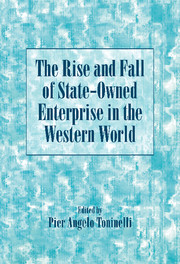Book contents
- Frontmatter
- Contents
- Preface
- Contributors
- PART I SETTING THE STAGE
- PART II NATIONAL CASES
- 5 The Rise and Fall of State-Owned Enterprise in Germany
- 6 Beyond State and Market: Italy's Futile Search for a Third Way
- 7 State Enterprise in Britain in the Twentieth Century
- 8 The Rise and Decline of State-Owned Industry in Twentieth-Century France
- 9 The Rise and Decline of Spanish State-Owned Firms
- 10 Fifty Years of State-Owned Industry in Austria, 1946–1996
- 11 A Reluctant State and Its Enterprises: State-Owned Enterprises in the Netherlands in the “Long” Twentieth Century
- 12 State-Owned Enterprises in a Hostile Environment: The U.S. Experience
- Conclusion: Schumpeter Revisited
- Index
7 - State Enterprise in Britain in the Twentieth Century
Published online by Cambridge University Press: 05 December 2011
- Frontmatter
- Contents
- Preface
- Contributors
- PART I SETTING THE STAGE
- PART II NATIONAL CASES
- 5 The Rise and Fall of State-Owned Enterprise in Germany
- 6 Beyond State and Market: Italy's Futile Search for a Third Way
- 7 State Enterprise in Britain in the Twentieth Century
- 8 The Rise and Decline of State-Owned Industry in Twentieth-Century France
- 9 The Rise and Decline of Spanish State-Owned Firms
- 10 Fifty Years of State-Owned Industry in Austria, 1946–1996
- 11 A Reluctant State and Its Enterprises: State-Owned Enterprises in the Netherlands in the “Long” Twentieth Century
- 12 State-Owned Enterprises in a Hostile Environment: The U.S. Experience
- Conclusion: Schumpeter Revisited
- Index
Summary
Both the rise and the fall of state enterprise in Britain are shrouded in myths. The scope and incidence of public ownership cannot readily be explained as a manifestation of socialism, as many have assumed. It is a common but also unsubstantiated view that the nationalized industries were a particularly inefficient sector of the British economy in the 1950s, 1960s, and 1970s (Aldcroft 1986, 223; Alford 1988; Cairncross 1985, 465, 467; Pryke 1981; Shackleton 1982). The major drive to state enterprise in Britain took place just after World War II. Yet it largely excluded manufacturing, commerce, and land, a fact difficult to reconcile with a perception of the nationalizations as the centerpiece of the socialist vision of the 1945–51 Labour government or as reflecting a desire to commandeer the means of production. Even in the nineteenth century, the rise of municipal ownership predated the so-called gas and water socialism associated with the Webbs and the Fabians. From the middle of the nineteenth century to the late twentieth century, public ownership was concentrated in the infrastructure of the economy and reflected in part the difficulties of regulating that sector under private ownership. As for the second myth, detailed studies suggest that the performance of the nationalized sector in the period 1950–85 is not a clear-cut issue.
- Type
- Chapter
- Information
- The Rise and Fall of State-Owned Enterprise in the Western World , pp. 157 - 184Publisher: Cambridge University PressPrint publication year: 2000
- 12
- Cited by

